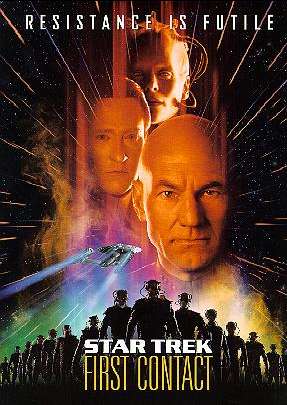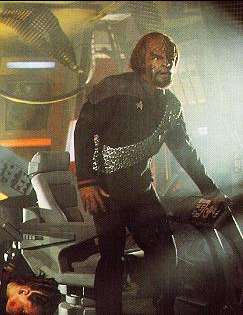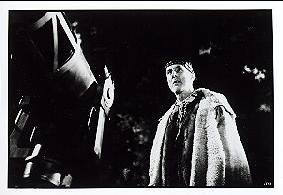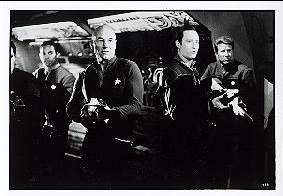click for new |
 |
| Festivale Spring 1996 |

|
Star Trek Time TrekScience fiction, the best of it, perhaps, challenges the way we see the world. Where is the sense of wonder in this new Star Trek universe? The latest Star Trek movie begins with the sounds of a wonderful Jerry Goldsmith score as the opening credits appear in Spencer Tracy order - boy cast then girl cast (Tracy, when asked why he took star billing over Katherine Hepburn replied "this isn't a lifeboat"). | |
| Commences November 28, 1996 |
|
Well, this isn't a lifeboat, at least, it isn't an attempt to rescue a sinking ship.
Star Trek as a licensing phenomenon is alive and well.
Sadly, as a ground-breaking, mind-boggling series that challenges the way we see the
world, it is not well. It's a new Enterprise - they crashed the last one in the previous film. The Enterprise E is smaller, darker, cramped. Gone is the majestic sweep of the old bridge. "I always thought the Enterprise should look sleeker," says conceptual illustrator John Eaves, "I wanted it to look fast." |
|
Okay, hands up everyone who is laughing - in space aerodynamic lines are BULLSH*T!
The new ship is coupled with a new uniform, again, darker, heavier, with murky colours
and the lines of rank and responsibility blurred in a muddy palette. There is something
very dark in the way that USAmericans see the future, their science fiction is becoming
grimmer, reminiscent of the early years of the cold war, and the bright, well-lit, optimism
of the previous Enterprises is out of sync with today's view of tomorrow. Ironically, Patrick Stewart speaks of "the fundamental optimism of the series which colours everything". "Unlike any other science fiction franchise, Star Trek has to do with a future that people look to with admiration," adds producer Rick Berman. | 
|
| Hmmm. Let's look at Star Trek First Contact: the Borg attack the Federation and Starfleet command, distrusting Picard who has previously been assimilated by the Borg and carries psychological baggage, sends the Enterprise to the Neutral Zone. The Borg attack whereupon Picard (proving that he is unreliable and cannot be trusted) disobeys a direct order and takes his crew into battle. Now look at this carefully - Starfleet is about duty and honour and service, there are plenty of episodes about these issues. So when a starship captain goes rogue and disobeys orders while commanding a fast, heavily armoured vessel, the proper thing to do is for the first officer to seize command and throw the Captain in the brig. But in the Berman, Braga and Moore universe he is instead unquestioningly accepted as the leader of the battle. Mind you, when the captain continues to behave in a bizarre manner, Doctor Crusher is definite about the need to obey HIS orders. Nup. Doesn't happen. If the captain says "screw the chain of command", the crew who agree with him aren't going to be very worried about obeying HIM. | ||

James Cromwell as Zefram Cochrane | Next bit. Zefram Cochrane, inventor of the warp drive, the man who made "first contact" (with an alien race), was seen in the original Star Trek series. His then companion must have done some interesting manipulation because when he was younger he was older and taller. But he's played with a lot more flair here in the 21st century than in his previous 24th century incarnation.
Why this script, the third time travel story in a row for the Next Generation series? Brannon Braga says, "The Borg are undoubtedly the most popular villains … we then incorporated time travel … the other most popular element in the series." |
| So basically, they wrote a script by statistical analysis. But WHY do people like time travel stories? Or do they? Are not stories such as Yesterday's Enterprise popular because of the way they challenge our view of reality, not the plot device - HOW - they challenge our view of reality. Time travel is the device, not the story. Some science fiction, the best of it, perhaps, challenges the way we see the world.
Whether it is about the way we judge ourselves, the way we treat others, the assumptions we make about our world, in the end they leave us with the question - did I start living three decades ago, or did I begin 30 seconds ago with 30 years of false memories? Am I a human in a human world, or a single, lonely being in a virtual reality prison? Are we giants or an infinitesimal speck in the universe? Hey, hasn't Star Trek asked these unsettling questions in the past? You see, this is science fiction, asking, "What if?" But the Star Trek of BB&M is not. It is a formula with familiar characters that plays through 120 minutes of our lives. Check out their pedigrees: Cheers, Family Ties, and Webster.
|
| Isn't it about time we have some startling science fiction coming out of the space-based adventure series? Gene Roddenberry didn't create all of the brilliant concepts in Star Trek. He hired people with great ideas: D.C. Fontana, Harlan Ellison, et al. He fostered people like David Gerrold
(who went on to write the 'bible' for Next Generation writers).
There is a strong audience base for Star Trek, they go for the characters even if the story is rubbish. Some, admittedly build themselves into Trek in their fantasies (you know about the Star Trek porno stuff don't you?). Some attempt to find 'real-life' aggrandisement in clubs or real-life material enrichment in merchandising and retail sales. But just because people are willing, today, to settle for less than the best that Paramount can offer, doesn't mean that they should. Sure, go see this film. See it for Jonathan Frakes, a brilliant director who dragged his cast through a hackneyed script and found many moments to connect with the audience. "He was on top of all of us all the time and finessing moments and giving us other choices. It was really impressive" says Brent Spiner (Data). Frakes has directed some of the strongest Star Trek episodes. He has a good relationship with cast and crew, says Marina Sirtis (Troi), "He knows how to make it look existing and interesting. The crew love him, so there's this really great feeling that everyone is trying their hardest to make this the best film we can." Imagine what this man could do with a really meaty script. He deserves it, and the audience deserves it. |
| Star Trek, after 30 years, the name continues, but what about the soul? Ali Kayn (November, 1996)
See also: Interview with Majel Barrett Roddenberry | |
|
Like us on facebook |
 |
| Just the facts:
Star Trek First Contact | ||
|
For session times of current films, use the cinema listings on the Movie links page. For scheduled release dates, see the coming attractions section. For more information about this movie, check out the internet movie database. For the latest additions to Festivale, check out the change history section. |
|
Like us on facebook | No other uses are permitted without the prior written consent of owner. Use of the material in violation of the foregoing may result in civil and/or criminal penalties. Celebrate everything! www.festivale.info ISSN 1328-8008 Published in Melbourne, Victoria, Australia disclaimers | contact the editor | Festivale revision history  Published in Melbourne, Victoria, Australia Published in Melbourne, Victoria, Australia  copyright © Festivale 2009 All rights reserved copyright © Festivale 2009 All rights reservedFiled 22 Nov-1996 Entire site refreshed: Dec 2008-Feb 2009 | Site URL transferred: Jan 2005 (previously www.festivale.webcentral.com.au) |

